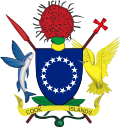| President of the House of Ariki | |
|---|---|
| Te Kaumaiti Nui o te Are Ariki | |
 | |
| Type | Presiding Officer |
| Member of | House of Ariki |
| Nominator | House of Ariki |
| Appointer | King's Representative |
| Term length | 4 years, [1] renewable |
| Constituting instrument | |
| Formation | 23 September 1966 |
| First holder | Vakatini Tepo [3] |
 |
|---|
This is a list of presidents of the House of Ariki of the Cook Islands from 1978. [4]
| Name | Entered office | Left office |
|---|---|---|
| Makea Karika Takau Margaret Ariki [5] | 1978 | 1980 |
| Pa Tepaeru Terito Ariki, Lady Davis [5] | 1980 | 1990 |
| Makea Karika Takau Margaret Ariki [5] | 1990 | 1992 |
| Pa Tepaeru Teariki Upokotini Marie Ariki [5] | 1992 | 2002 |
| Tou Travel Ariki [6] | 2002 | 2006 |
| Ada Rongomatane Ariki [5] [a] | 2006 | January 2008 [7] |
| Tou Travel Ariki | December 2008 | Present [b] |
